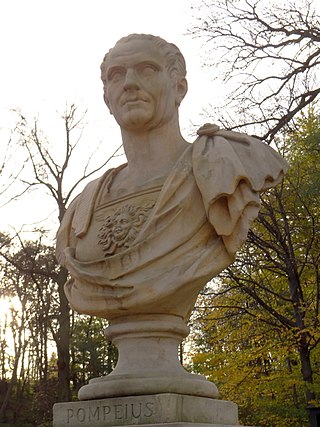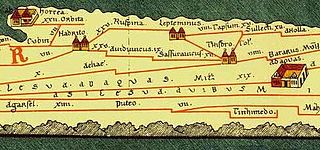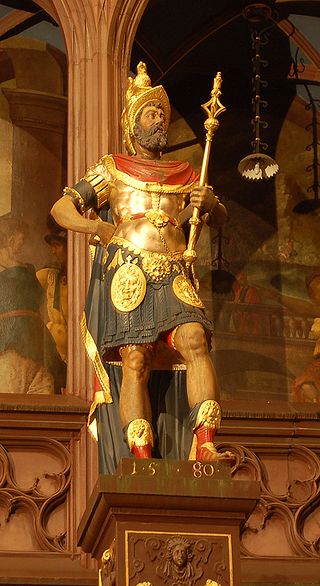Related Research Articles

Commentarii de Bello Gallico, also Bellum Gallicum, is Julius Caesar's firsthand account of the Gallic Wars, written as a third-person narrative. In it Caesar describes the battles and intrigues that took place in the nine years he spent fighting the Celtic and Germanic peoples in Gaul that opposed Roman conquest.

The gens Julia was one of the most prominent patrician families in ancient Rome. Members of the gens attained the highest dignities of the state in the earliest times of the Republic. The first of the family to obtain the consulship was Gaius Julius Iulus in 489 BC. The gens is perhaps best known, however, for Gaius Julius Caesar, the dictator and grand uncle of the emperor Augustus, through whom the name was passed to the so-called Julio-Claudian dynasty of the first century AD. The nomen Julius became very common in imperial times, as the descendants of persons enrolled as citizens under the early emperors began to make their mark in history.
Aulus Hirtius was consul of the Roman Republic in 43 BC and a writer on military subjects. He was killed during his consulship in battle against Mark Antony at the Battle of Mutina.

The gens Pompeia was a plebeian family at ancient Rome, first appearing in history during the second century BC, and frequently occupying the highest offices of the Roman state from then until imperial times. The first of the Pompeii to obtain the consulship was Quintus Pompeius in 141 BC, but by far the most illustrious of the gens was Gnaeus Pompeius, surnamed Magnus, a distinguished general under the dictator Sulla, who became a member of the First Triumvirate, together with Caesar and Crassus. After the death of Crassus, the rivalry between Caesar and Pompeius led to the Civil War, one of the defining events of the final years of the Roman Republic.

Commentarii de Bello Civili(Commentaries on the Civil War), or Bellum Civile, is an account written by Julius Caesar of his war against Gnaeus Pompeius and the Roman Senate. It consists of three books covering the events of 49–48 BC, from shortly before Caesar's invasion of Italy to Pompey's defeat at the Battle of Pharsalus and flight to Egypt. It was preceded by the much longer account of Caesar's campaigns in Gaul and was followed by similar works covering the ensuing wars against the remnants of Pompey's armies in Egypt, North Africa, and Spain. Caesar's authorship of the Commentarii de Bello Civili is not disputed, while the three later works are believed to have been written by contemporaries of Caesar.

In the course of his Gallic Wars, Julius Caesar invaded Britain twice: in 55 and 54 BC. On the first occasion Caesar took with him only two legions, and achieved little beyond a landing on the coast of Kent. The second invasion consisted of 628 ships, five legions and 2,000 cavalry. The force was so imposing that the Britons did not dare contest Caesar's landing in Kent, waiting instead until he began to move inland. Caesar eventually penetrated into Middlesex and crossed the Thames, forcing the British warlord Cassivellaunus to surrender as a tributary to Rome and setting up Mandubracius of the Trinovantes as client king.

Lucius Cassius Longinus was consul of the Roman Republic in 107 BC. His colleague was Gaius Marius, then serving the first of his seven consulships.

Leptis or Lepcis Parva was a Phoenician colony and Carthaginian and Roman port on Africa's Mediterranean coast, corresponding to the modern town Lemta, just south of Monastir, Tunisia. In antiquity, it was one of the wealthiest cities in the region.
Quintus Atrius was a Roman military officer involved in Julius Caesar's second expedition to Britain in 54 BC. He was left in charge of ten cohorts of infantry and 300 cavalry to guard the beach-head while Caesar began his march inland, but halted his commander's advance by sending him word that his ships had been damaged by a storm while riding at anchor off the shore.

The gens Minucia was an ancient Roman family, which flourished from the earliest days of the Republic until imperial times. The gens was apparently of patrician origin, but was better known by its plebeian branches. The first of the Minucii to hold the consulship was Marcus Minucius Augurinus, elected consul in 497 BC.
The gens Otacilia, originally Octacilia, was a plebeian family at ancient Rome. The gens first rose to prominence during the First Punic War, but afterwards lapsed into obscurity. The first of the family to obtain the consulship was Manius Otacilius Crassus, in 263 BC.
Marcus Petreius was a Roman politician and general. He was a client of Pompey and like Pompey he came from Picenum a region in eastern Italy. He cornered and killed the notorious rebel Catiline at Pistoia.
The gens Arpineia was an obscure plebeian family at ancient Rome. It is known chiefly from a single individual, Gaius Arpineius, an eques in the army of Caesar's army during the Gallic Wars.
The gens Titia was a plebeian family at ancient Rome. The gens is rarely mentioned in the Republican period, and did not rise out of obscurity till a very late time. None of its members obtained the consulship under the Republic, and the first person of the name who held this office was Marcus Titius in BC 31.

The gens Canuleia was a minor plebeian family at ancient Rome. Although members of this gens are known throughout the period of the Republic, and were of senatorial rank, none of them ever obtained the consulship. However, the Canuleii furnished the Republic with several tribunes of the plebs.
The gens Sextia was a plebeian family at ancient Rome, from the time of the early Republic and continuing into imperial times. The most famous member of the gens was Lucius Sextius Lateranus, who as tribune of the plebs from 376 to 367 BC, prevented the election of the annual magistrates, until the passage of the lex Licinia Sextia, otherwise known as the "Licinian Rogations," in the latter year. This law, brought forward by Sextius and his colleague, Gaius Licinius Calvus, opened the consulship to the plebeians, and in the following year Sextius was elected the first plebeian consul. Despite the antiquity of the family, only one other member obtained the consulship during the time of the Republic. Their name occurs more often in the consular fasti under the Empire.
Sextus Julius Sex. f. Sex. n. Caesar was a cousin of the Roman general Gaius Julius Caesar, and served as one of his lieutenants during the Civil War. He was killed in a revolt of the soldiers while still a young man.
The gens Lucceia, occasionally Luceia or Luccia, was a plebeian family at Rome, which flourished during the final century of the Republic and under the early Empire.

The gens Munatia was a plebeian family at Rome. Members of this gens are first mentioned during the second century BC, but they did not obtain any of the higher offices of the Roman state until imperial times.
The siege of Curicta was a military confrontation that took place during the early stages of Caesar's Civil War. Occurring in 49 BC, it saw a significant force of Populares commanded by Gaius Antonius besieged on the island of Curicta by an Optimate fleet under Lucius Scribonius Libo and Marcus Octavius. It immediately followed and was the result of a naval defeat by Publius Cornelius Dolabella and Antonius eventually capitulated under prolonged siege. These two defeats were some of the most significant suffered by the Populares during the civil war.
References
- ↑ Gaius Julius Caesar, Commentarii de Bello Gallico v. 9, 10.
- ↑ Gaius Julius Caesar (attributed), De Bello Africo 68, 89.
![]() This article incorporates text from a publication now in the public domain : Smith, William, ed. (1870). Dictionary of Greek and Roman Biography and Mythology .
This article incorporates text from a publication now in the public domain : Smith, William, ed. (1870). Dictionary of Greek and Roman Biography and Mythology .{{cite encyclopedia}}: Missing or empty |title= (help)